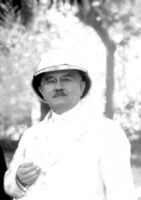Finot, L.: Difference between revisions
No edit summary |
No edit summary |
||
| Line 1: | Line 1: | ||
{{Person | {{Person | ||
| | |MainNamePhon=Louis Finot | ||
|SortName=Finot, Louis | |||
| | |||
|namefirst=Louis | |namefirst=Louis | ||
|namelast=Finot | |namelast=Finot | ||
|PersonType=Other Researchers; Translators | |||
|bio=Louis Finot (1864 in Bar-sur-Aube - 1935 in Toulon) was a French archeologist and researcher, specialising in the cultures of Southeast Asia. A former director of the Ecole française d'Extrême-Orient, his contribution to the study of Khmer history, architecture and epigraphy is widely recognised. | |||
A bachelor of law and letters, Finot was admitted to the École Nationale des Chartes in 1886. He left it two years later with the title of palaeographer. He worked initially as a trainee then as an assistant librarian with the French National Library and undertook studies of Sanskrit. In 1898, he was named director of the archaeological mission in Indochina, which would become in 1900 the Ecole française d'Extrême-Orient (EFEO). In 1933 he became a member of the Académie des Inscriptions et Belles-Lettres. ([https://en.wikipedia.org/wiki/Louis_Finot_(archaeologist) Source Accessed Jan 8, 2021]) | |||
|images=File:Louis Finot Wikipedia.jpg | |||
|yearbirth=1864 | |yearbirth=1864 | ||
|yeardeath=1935 | |yeardeath=1935 | ||
|bornin=Bar-sur-Aube, France | |bornin=Bar-sur-Aube, France | ||
| | |HasDrlPage=Yes | ||
|HasLibPage=Yes | |||
|pagename=Finot, L. | |||
|languageprimary=French | |languageprimary=French | ||
|languagetranslation=Sanskrit | |languagetranslation=Sanskrit | ||
Latest revision as of 18:06, 30 September 2022
| PersonType | Category:Other Researchers Category:Translators |
|---|---|
| FirstName / namefirst | Louis |
| LastName / namelast | Finot |
| MainNamePhon | Louis Finot |
| SortName | Finot, Louis |
| bio | Louis Finot (1864 in Bar-sur-Aube - 1935 in Toulon) was a French archeologist and researcher, specialising in the cultures of Southeast Asia. A former director of the Ecole française d'Extrême-Orient, his contribution to the study of Khmer history, architecture and epigraphy is widely recognised.
A bachelor of law and letters, Finot was admitted to the École Nationale des Chartes in 1886. He left it two years later with the title of palaeographer. He worked initially as a trainee then as an assistant librarian with the French National Library and undertook studies of Sanskrit. In 1898, he was named director of the archaeological mission in Indochina, which would become in 1900 the Ecole française d'Extrême-Orient (EFEO). In 1933 he became a member of the Académie des Inscriptions et Belles-Lettres. (Source Accessed Jan 8, 2021) |
| YearBirth | 1864 |
| YearDeath | 1935 |
| BornIn | Bar-sur-Aube, France |
| languageprimary | French |
| languagetranslation | Sanskrit |
| languagetarget | French |
| IsInGyatsa | No |
| Other wikis |
If the page does not yet exist on the remote wiki, you can paste the tag |
